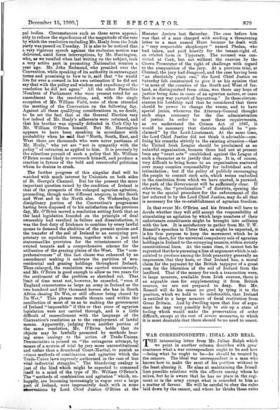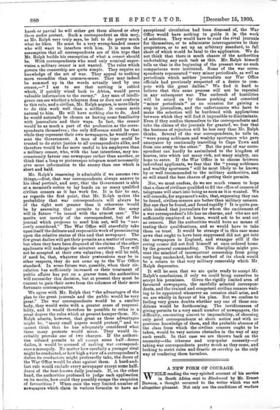WARCORRESPONDENTS : IDEAL AND REAL. T HE interesting letter from Mr.
Julian Ralph which we print in another column describes with Brea' exactness what a war correspondent ought to be and hoe —being what he ought to be—he should be treated by the censors. The ideal war correspondent is a, man who knows how to make the most of his position without in the least abusing it. He aims at maintaining the friend- liest possible relations with the officers among whom he mixes, but he is aware that he has no place in the regi- ment or in the army except what is conceded to him as a matter of favour. He will be careful to obey the rules laid down by the censor, and where he thinks these rules harsh or partial he will either get them altered or obey them under protest. Such.a correspondent as this may, as Mr. Ralph very truly says, be left to do pretty much what he likes. He must be a very wrong-headed censor who will want to interfere with him. It is upon the assumption that all correspondents are of this type that Mr. Ralph builds his conception of what a censor should be. With correspondents who need only nominal super- vision a military censor is not wanted. The rules which govern the censorship are quite simple. They require no knowledge of the art of war. They appeal to nothing more recondite than common-sense. They may indeed be summed up in the words actually used by one censor,—" I am to see that nothing is cabled which, if quickly wired back to Africa, would prove valuable information to the enemy." Any man of intelli- gence can see whether a telegram does or does not conform to this rule, and a civilian, Mr. Ralph argues, is more likely to do this work well than a soldier. It comes more natural to him. He will have nothing else to do. And he would naturally be chosen as having some familiarity with journalists and their ways. In fact, the censor would be as much a part of the profession as the corre- spondents themselves ; the only difference would be that while they represent their own newspapers, he would repre- sent the Government. A man of this type could be trusted to do strict justice to all correspondents alike, and therefore would be far more useful to his employers than a military censor, who, with the best intentions, may un- consciously favour one newspaper rather than another, or think that a long or picturesque telegram must necessarily give more information to the enemy than one which is short and bald.
Mr. Ralph's reasoning is admirable if we assume two things,—first, that war correspondents always answer to his ideal portrait, and next, that the Government is able at a moment's notice to lay hands on as many qualified civilian censors as it has work for. It is fair to say, as regards the first point, that Mr. Ralph makes the probability that war correspondents will always be of the right sort greater than it otherwise would be by assuming, that permits to follow the army will in future " be issued with the utmost care." The merits not merely of the correspondent, but of the journal which proposes to send him out, will be "nar- rowly considered." The War Office will cheerfully take upon itself the delicate and responsible work of pronouncing upon the relative status of this and that newspaper. The few great dailies will get their permits as a matter of course, but when they have been disposed of the claims of the other applicants will undergo the minutest scrutiny. They will not be accepted at their own valuation ; they will be told, if need be, that, whatever their pretensions may be in other respects, they do not come up to the War Office standard. In some future war, possibly, when their cir- culation has sufficiently increased or their treatment of public affairs has put on a graver tone, the authorities will reconsider this decision, but at present they must be content to gain their news from the columns of their more fortunate contemporaries.
We agree with Mr. Ralph that " the advantages of the plan to the great journals and the public would be very great." The war correspondents would be a smaller body, they would write with a greater sense of responsi- bility, and it would therefore be possible to relax iu a great degree the rules which at present hamper them. Mr. Ralph admits, however, that great as these advantages might be, "many small papers would protest," and we cannot think that he has adequately considered what these many protests would mean. They would in- evitably provoke one of two charges. If the authori- ties refused permits to all except some half - dozen dailies, it would be accused of making war correspond- ence a monopoly. No matter how carefully a younger rival might be conducted, or how high a view of a correspondent's duties its conductors might professedly take, the doors of the War Office would be shut against them. A hard-and- fast rule would exclude every newspaper except some half- dozen of the best-known daily journals. If, on the other hand, the authorities professed to judge each application on its merits, how could they possibly escape the suspicion of favouritism ? When once the very limited number of newspapers which claim in various formulas to have an exceptional circulation' had been disposed of, the War Office would have nothing to guide it in the work of selection. They would have to read the rival journals for themselves, or to administer interrogatories to their proprietors, or to set up an arbitrary standard, to fall short of which would be fatal to the application. We do not think that there is much chance of the authorities undertaking any such task as this. Mr. Ralph himself tells us that in the beginning of the present war no such comparisons were instituted. Some of the war corre. spondents represented "very minor periodicals, as well as periodicals which neither journalists nor War Office officials had previously suspected of a desire to com- pete with the great dailies." We find it hard to believe that this same process will not be repeated in any subsequent war. The outbreak of hostilities will be seized on by these pushing and conceited "minor periodicals" as an occasion for gaining a step in journalism, and the unfortunates who have to make the selection will be burdened with applications between which they will find it impossible to discriminate. Even if they confine themselves to the correspondents and take the claims of the journals for granted, we fear that the business of rejection will be less easy than Mr. Ralph thinks. Several of the war correspondents, he tells us, "were young noblemen and wealthy sportsmen who gave annoyance by continually travelling to Cape Town and from one army to the other." But the post of war corre- spondent can hardly be assimilated to the kingdom of heaven, into which not many rich, not many mighty, can hope to enter. If the War Office is to choose between individual applicants, we fear that the "young noblemen and wealthy sportsmen" will be most likely to be known by or well recommended to the military authorities, and so will stand the best chance of getting their permits.
Nor, we must confess, do we see much reason to hope that a class of civilians qualified to fill the office of censors of telegrams will start into being as soon as it is wanted. We will concede, for argument's sake, that, supposing they can be found, civilian censors are better than military censors. But can they be found, and found rapidly ? It is quite pos- sible indeed that journalists for whom the excitement of . a war correspondent's life has no charms, and who are not sufficiently employed at home, would ask to be sent out as censors. But the authorities would have no means of testing their qualifications, and so would have to take them on trust. It would be strange if in this case some news that ought to have been suppressed did not get into the newspapers in England, and stranger still if the erring censor did not find himself at once ordered home by the general commanding. This discipline might pre- vent the mischief of incompetent censorship from going very long unchecked, but the method of its check would be a return to that very military censorship which Mr. Ralph deprecates.
It will be seen that we are quite ready to accept Mr. Ralph's conclusions, if only we could bring ourselves to accept his premisses. Given the rigidly limited area of favoured newspapers, the carefully selected correspon- dents, and the trained and competent civilian censors wait- ing to be appointed whenever an occasion shall arise, and we are wholly in favour of his plan. But we confess to feeling very grave doubts whether any one of these con- ditions would be forthcoming. The invidiousness of giving permits to a very small number of newspapers, the difficulty, amounting almost to impossibility, of choosing only good correspondents at short notice and with no previous knowledge of them, and the probable absence of the class from which the civilian censors ought to be taken, would be very serious obstacles in the way of any such result. In that case we are thrown back on the necessity—the irksome and unpopular necessity—of taking war correspondents pretty much as they come, and looking to strict rules and drastic ce isorship as the only way of rendering them harmless.















































 Previous page
Previous page